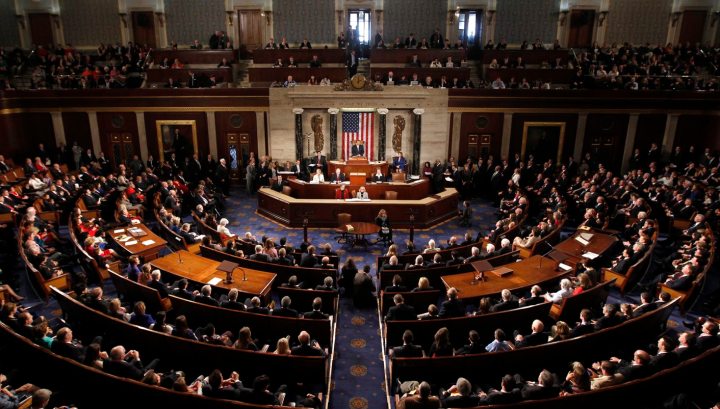Newsdeck
US debt limit extension bill passes House, gets Reid endorsement

The U.S. House of Representatives on Wednesday passed a Republican plan to allow the federal government to keep borrowing money through mid-May, clearing it for fast enactment after the top Senate Democrat and White House endorsed it. By David Lawder.
The 285-144 vote in the Republican-controlled House drew the opposition of 111 Democrats, many of whom labeled it a negotiating gimmick that would set up a new “fiscal cliff” weeks after the White House and Congress reached a deal to avert a package of automatic spending cuts and tax hikes.
The 33 Republicans who voted against the bill on Wednesday were largely dissatisfied with the lack of spending cuts.
The plan avoids for the time being a repeat of the 2011 debt ceiling standoff that rattled markets and prompted a downgrade of the government’s triple-A credit rating. The U.S. Treasury is expected to exhaust remaining borrowing capacity under the $16.4 trillion debt limit between mid-February and early March.
The House vote marked a sharp departure from Republican vows to use the debt ceiling issue as a way to extract spending cuts from President Barack Obama.
But House Speaker John Boehner warned immediately after Wednesday’s vote that Republicans would take the next opportunity – automatic budget cuts set for March 1 – to demand “reforms” from Obama.
The automatic cuts, which were temporarily delayed earlier this month in a fiscal deal between the White House and Congress, are “going to go into effect” unless Obama makes concessions, Boehner said.
The bill aims to draw Senate Democrats into the debate by requiring both chambers to pass a formal budget resolution by April 15. If either the House or Senate fails to meet this deadline, lawmakers’ pay is suspended until they pass a budget.
Republicans have named the bill the “No Budget, No Pay Act of 2013.” The Senate has not passed a budget in nearly four years, causing the government to rely on stop-gap spending measures to fund its operations.
Senate Majority Leader Harry Reid said the Democratic-controlled Senate would take up the bill and pass it without changes. He and other top Senate Democrats praised the Republican plan for not requiring spending cuts to match the increase in borrowing authority.
A Senate vote on the measure could come as early as next week.
Both Reid and President Barack Obama have called for a “clean” debt limit increase. The White House said on Tuesday that Obama would not stand in the way of the bill if it was passed by Congress.
Senate Budget Committee Chairwoman Patty Murray said on Wednesday she would produce a budget that reflected Democratic values, putting jobs, growth and the middle class first. This would contrast with recent Republican budget plans that would gut investments in jobs and education, cut taxes for the wealthy and “end Medicare as we know it,” she said in a statement.
“We know that when our priorities are laid out next to Republicans’ the public stands with us,” Murray said, adding that she was looking forward to sparring with her Republican counterpart, House Budget Committee Chairman Paul Ryan.
House Republicans backed the debt-limit extension in the face of polls showing Americans blaming them, rather than Democrats, for the uncertainty surrounding the so-called “fiscal cliff” that was resolved around New Year’s Day by raising taxes on the wealthy.
BREATHING SPACE
The bill avoids an immediate threat of U.S. default by suspending limits on the government’s ability to borrow until May 19. It does not specify a dollar amount for debt ceiling increase, but allows borrowing as needed to meet federal obligations that must be paid by that date.
Congress would then have to agree on a new, longer-term debt ceiling increase around that time – a deal that would not likely come without a more comprehensive deficit reduction plan.
But May 19 isn’t a deadline for default. The Treasury would be able to redeploy its emergency cash management measures at that time, likely pushing a final day of reckoning into July.
Boehner, who unveiled the debt limit extension plan last week, said he and fellow House Republicans were committed to passing a budget that would reach balance in 10 years.
According to budget experts, achieving such a goal, especially in the absence of additional tax hikes, would require massive cuts in federal spending beyond any envisioned in previous Republican-backed budgets or in the deficit-reduction plans of panels such as the bi-partisan Bowles-Simpson commission on Fiscal Responsibility and Reform.
Even Ryan’s controversial budget plan last year did not envision reaching a surplus until about 2040, despite deep spending cuts.
The government is currently on track for its fifth straight fiscal year with a deficit exceeding $1 trillion – a trajectory widely viewed as eventually leading to a debt downgrade.
“My goodness, we ought to be able to balance the budget over the next 10 years,” Boehner said on the House floor.
Ryan, who was the Republican vice presidential nominee in the 2012 election, said the measure was aimed at prompting a robust debate in Congress over how to achieve a more sustainable fiscal path.
“We see this as a very defining moment for this session of Congress and our caucus on getting a down payment on the debt crisis, on averting it,” Ryan said at a media breakfast sponsored by the Wall Street Journal.
Many House Democrats objected to the short-term nature of the debt limit extension, saying it at would keep a cloud of uncertainty hanging over financial markets and cause volatility and higher interest rates.
“We should not continue to have this sword of default over the heads of Congress and the American economy,” said Representative Sander Levin, the senior Democrat on the tax-writing Ways and Means Committee.
SEQUESTER SHOWDOWN
The House plan shifts the budget debate to the March 1 start of automatic spending cuts for military and domestic programs, and to the March 27 expiration of funding needed to keep federal agencies operating.
Ryan said he believed that the automatic cuts, known as a sequester, would likely proceed without changes, because no alternatives have been advanced by Senate Democrats or the Obama administration.
The House last year passed two bills to replace the sequester cuts for fiscal 2013, sparing any reductions for military programs, while shifting more of the cuts onto many domestic programs aimed at aiding the poor, including the Medicaid healthcare program and social services block grants.
After the “fiscal cliff” deal, signed by Obama on Jan. 2, raised taxes on the wealthy and delayed the start of automatic cuts, Congress faces about $85 billion in cuts for the remainder of fiscal 2013, which ends on April 14.
The budget plans that the legislation aims to enforce would set discretionary spending levels for fiscal 2014, which starts on Oct. 1. DM
Photo: Speaker of the House John Boehner addresses the 113th Congress in the Capitol in Washington January 3, 2013. REUTERS/Kevin Lamarque


















 Become an Insider
Become an Insider